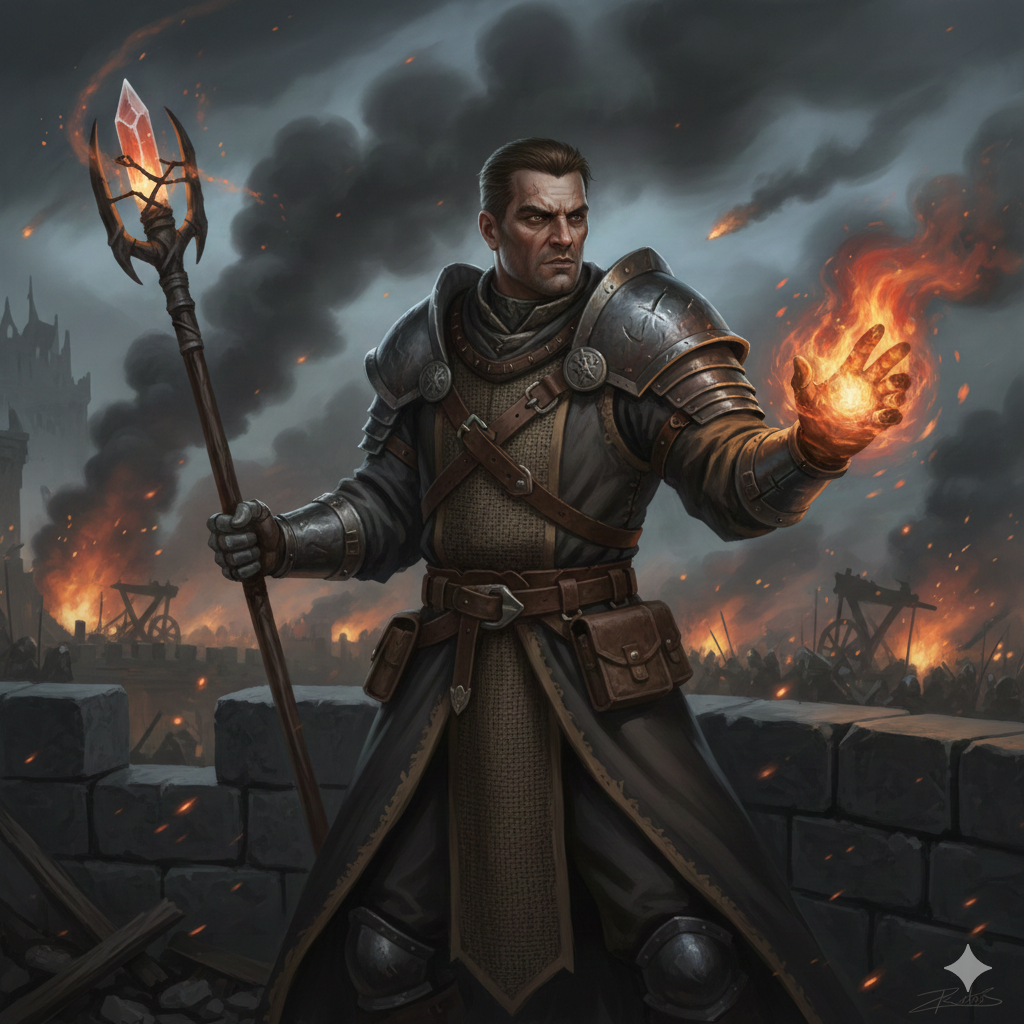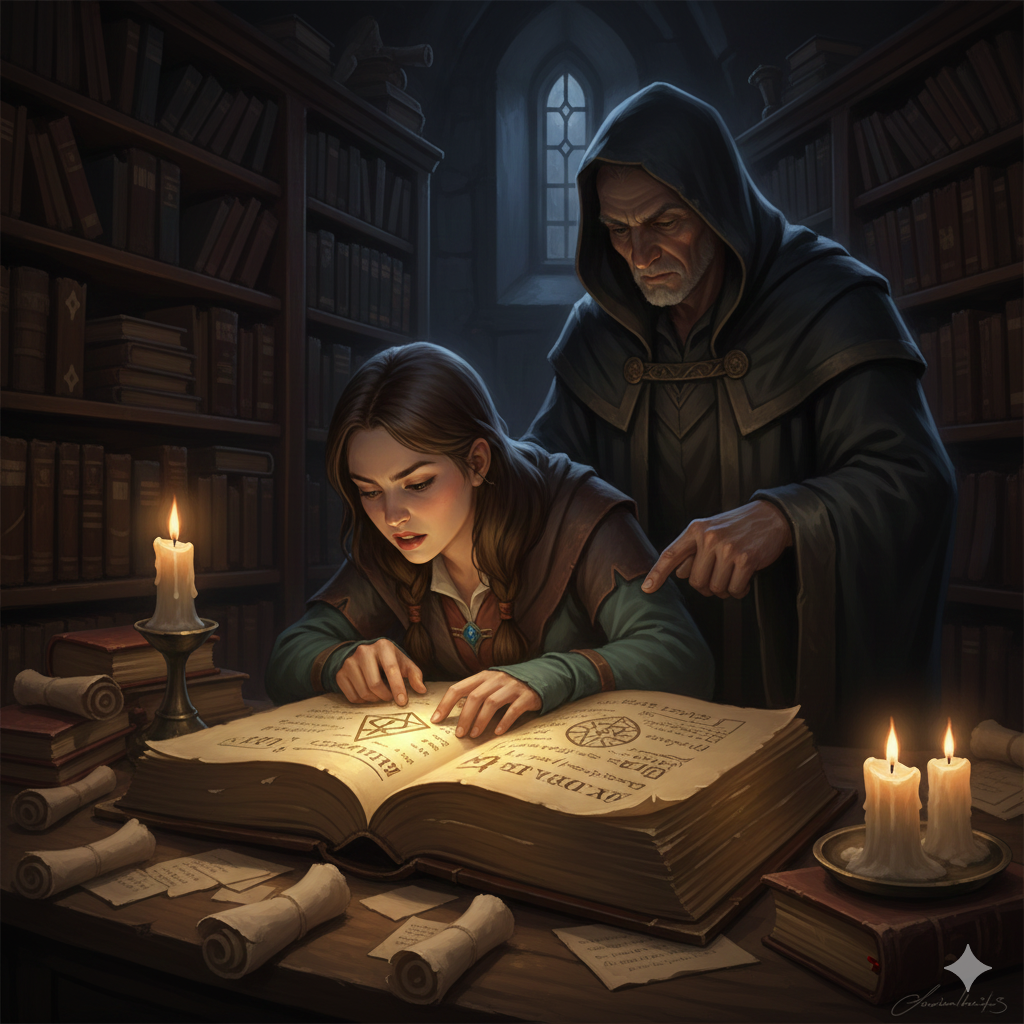OSR Expert Class Progressions
Created: 2025-06-11 21:32:52 | Last Modified: 2026-01-29 12:44:02
Table of Contents generated with DocToc
- Rationale
- What is a class progression
- Worked Example
- Level 4 class progressions
Rationale
We've been playing oldschool essentials recently, and it's great. However, my players did voice some concerns about lack of character progression and unfulfilled power fantasies and such.
Now we all know the drill, it's the OSR, you're a baby, start playing the game stop playing the character sheet, yada yada. The thing is I found myself agreeing with them, at least to some degree. I don't want button push play or pathfinder style character builds. Just a little more meat on the bones would be so juicy.
So the below class progressions are my attempt to rectify that. A class progression is kind of like a subclass that you pick at level 4. They should give players a little bit more choice, specificity, and power, without doing any of the following:
- Overwhelm new players with ability choices at level 1
- Lock players into character "builds" where all future choices are planned out
- make you Feel like a loser for multiclassing
- Introduce custom class resources
- Overload character sheets with additional abilities, at worst resulting in button-push play
It's still a work-in-progress and needs testing by my divinely patient players, but fortunately b/x is very hackable, and I think we got something decent.
What is a class progression
A class progression is a specialization of a class archetype. Class archetypes are
- Fighter
- Cleric
- Thief
- Magic-User
i.e. the four basic classes in b/x D&D, or OSE if you prefer. You can easily assign the demihumans to the archetypes.
A specialization of an archetype is made by combining the set of archetypes with itself one or more times. We write this with an arrow, like Fighter -> Thief, or Cleric -> Cleric, or Thief -> Magic-User -> Thief.
Specializations are not optional. Players must choose a specialization at certain levels. These levels are the same for all players, usually mark a new tier of play, and are often accompanied by in-fiction downtime. Of course, a player may keep choosing to specialize in the same archetype as oftenas they wish.
So far we will only consider one such specialization, at the beginning of the expert tier (level 4), simply because I usually don't get into the higher levels very much.
A sequence of specializations (written with the arrow) is what we call a class progression, sometimes also refered to as a career. At higher levels, a player character is mechanically identified no longer by merely their class, but by their career. E.g. "Bob is playing a level 6 Fighter -> Thief". Career's also all have their own little cool name to make this less awkward ("Bob is playing a level 6 warlord").
A specialization comes with certain mechanical and fictional changes to the character. These are described below under the level 4 class progressions for each archetype. When specializing, characters retain all previously gained stats and abilities, unless stated otherwise. They only gain what is explicitly mentioned in the specialization, e.g. if you start as thief you don't automatically keep getting skill points per level.
In general, the fictional and mechanical effects a specialization provides will push the character into the thematic direction of the chosen specialization, without abandonding their original archetype. If you started as a fighter, you will never become a spellcaster, but you can become good at killing them by learning about magic. Likewise, player's who start as clerics will always retain a connection to their faith and deity, but may choose to manifest their faith in different ways.
In particular, all specializations come with
- Hit Die: The new hit die, to be rolled for hit point increase upon first level with the specialization, and for subsequent levels after the specialization. This may be the same one as before.
- To-hit Bonus: Describes the total to hit bonus as a formula.
- XP as: Describes the XP required to level up by refering to the original OSE (or b/x) tables. If you don't use target 20 saves, this should also be the class whose saves you use.
- Requirement: Something that must be fulfilled before or upon choosing of this specialization. This often includes some fictional positioning, downtime, and sometimes gold.
In addition, you will see the following terms below:
- Character level: This refers to the total level of the caracter. The XP required to level up is always determined by the character level, independent of individual specialization level.
- With Barracks/Herb Garden/Chapel/...: These are additional benefits used with strongholds. You can ignore this if you don't play with strongholds, or just give your players the effect for free or if they had an extended rest.
Also, a lot of this will make most sense with my own house rules, like the rogue sneak attack with d6s and general use of target 20. Nothing too wild, though. I'm sure you can make it work.
These ideas are mostly stolen from Shadow of the Demon Lord, which has class paths for novice/expert and I think master, where you make a choice between essentially weapon/divine/magic at each tier. Chec kit out.
Worked Example
Let's say I have a character named Aribeth. Aribeth is a level 3 female fighter. Nothing crazy so far.
Now Aribeth and her group score big and haul a bunch of treasure home. She reaches 8100 XP and is ready for level 4. To level up, she must now specialize. She can choose
- Fighter again, and become a Champion with cool moves and the most HP. This is Fighter -> Fighter.
- Cleric, and become a Paladin with divine powers but less HP and fighting skill. This would be Fighter -> Cleric.
- Thief, and become a warlord who is good at leading followers into battle. That's Fighter -> Thief.
- Magic-User, and become an Inquisitor who is a magic resistant slayer of wizards. That's Fighter -> Magic-User.
She's always had a knack for helping the poor, and has met a powerful noble Lord in her travels, so she chooses Fighter -> Cleric and becomes a Paladin at character level 4 after a month of study and prayer and ceremonies. She picks "Cure Light Wounds" as her signature spell and vows to aid the downtrodden and destitute.
At level 3 Aribeth had 13 maximum hit points (from 3d8). Since she chose Paladin for her 4th level she now rolls a d6, which comes up 2, and so she now has 15 max HP.
What's her to-hit bonus now? Well, we use target 20, so here's how it would work: Choosing a progression like this doesn't retroactively change your to-hit bonus, so she retains the +3 she had as a fighter from her first 3 levels, and gains +2/3 for every paladin level from now on. Unfortunately that's 0 right now, so her to-hit bonus doesn't increase. Just to be clear, at level 6, Aribeth would have a to-hit bonus of +5 (3 from fighter levels, 2 from 3 paladin levels).
Her next level will be at 12000 XP, since she now levels with the XP requirements of a cleric, and 12000 is what a cleric needs to reach level 5.
Level 4 class progressions
Below are the actual progressions for each class. Only expert tier so far.
If you are playing a non-archetype class and want to specialize, I recommend the following
- Druids: Treat as cleric for base class. Replace divine spells with druid spell list, and monasteries/churches with groves/circles. In the future, druids might get their own archetype (Fighter -> Druid is a ranger).
- Dwarf: Treat as fighter.
- Halfling: Treat as Thief.
- Elf: Treat as Magic-User or fighter. At level 4, elves will need to choose their path.
- Illusionist: Treat as Magic-User.
Fighter
Fighter -> Fighter: Champion
- Hit Die: d8
- To-hit Bonus: 1 * character level
- XP as: Fighter
- Requires: Nothing.

You gain +1d4 damage. When you hit and roll your new damage die, On a 4, you may execute a mighty deed.
A mighty deed is a special feat of heroic combat action. It must be announced before your attack roll. It can be something like the following
- cut off the poisonous tail of a wyvern
- blind a cyclops with your spear
- swing from a chandelier to kick the wizard in the face, knocking him prone
- slide down the stairs on your shield while shooting arrows at the orcs
- disarm the black knight
- send the goblin flying with your mace, thereby hitting the lever to close the portcullis
A mighty deed may never
- increase the damage you deal
- directly increase your attack bonus to the target
Most mighty deeds should just work. Be reasonable. The referee may ask for additional checks if your mighty deed is very elaborate and involves several actions.
Your enemies can eventually wise up to your tricks. If you repeat a mighty deed in the same session or against the same enemies, the target of your mighty deed may attempt a death save to avoid it. Smart champions switch things up.
In addition, as a champion, you become more resilient. Once in your life, when you would otherwise die, you may choose to survive instead, taking a permanent scar, injury or disibility, like an eyepatch or missing limb. When you do this, your career as a champion is over,and all your champion levels are converted to warlord (see below).
With Barracks: You can teach any special weapon move you know to other characters with 1 week of downtime and training.
Note: If you play in a game with death saves upon reaching 0 HP, the decision to become a warlord must be announced before any death saves are made, in which case no death save needs to be rolled and the character is automatically considered incapacitated but stable. Champion players are free to forego this choice. Many prefer to gamble on the natural death save, and either live or die as a champion.
Thanks to Dungeon Crawl Classics for the mighty deeds feature, which everyone should steal.
Fighter -> Cleric: Paladin
- Hit Die: d6
- To-hit Bonus: 3 + (2/3 * Paladin level)
- XP as: Cleric
- Requires: Finding a mentor as your guide and councilor and studying with them for 1 month, then swearing a vow, creed or oath with them. Also requires at least 10 charisma.

Pick a 1st or 2nd level spell from the cleric spell list that is appropriate to the oath you swore to your mentor. You can cast this spell innately once a day. If you ever break your oath, you lose the ability to cast this spell innately until you atone with your mentor.
You start to gain divine spell slots with your 2nd paladin level (character level 5), similar to a cleric.
You gain the ability to turn undead/channel divinity, using your paladin level to determine the strength of the turning.
You gain a +1 bonus to your reaction roll with knights and other low ranking nobility.
Your faith and devotion protect you. You nmay shrug off the source of any damage and ignore it completely, even if it would otherwise kill you, and even if it is catastrophic damage, such as from falling into a deep chasm or touching a sphere of annihilation. After you ignore damage in this way once, you cannot do so again until you reinvigorate your commitment to your oath by spending at least 1 day in quiet prayer, discussion with your mentor, working good deeds or similar.
With Chapel: You can channel divinity as part of an attack. Successfully channeling divinity let's you deal additional d6 equal to your cleric level to a foe that is a demon, undead, an outsider or an abberration as holy smiting damage. Beware though, as failing to channel may bolster your foe.
Note: Although paladins often swear their oath to a religious authority, this is not a requirement. You may pick, for example, a noble lord or lady as your mentor. Likewise, your oath may be of an entirely secular nature. It is only required that it be for a genuinely noble, selfless cause, like protecting the innocent or helping the sick. In this case, the paladins magical powers stem not from a divine source, but from the mere strength of their conviction.
Fighter -> Thief: Warlord
- Hit Die: d6
- To-hit Bonus: 1 * character level
- XP as: Fighter
- Requires: Large scar, eyepatch, or other visible disability. You must also have at least 2 retainers who become your right-hands and troop commanders.

You gain +1 to your loyalty.
Your max retainers are doubled.
You can hire mercenaries at half price.
You gain a +1 to reaction rolls with soldiers, bandits, commanders, warriors, and gladiators. Not knights and nobles.
When parrying or when wearing a shield, you can extend the respective AC bonus to one adjacent ally, provided you do not move during the round.
Forced by your scars, and enabled by your experience, you tend to fight dirty. You gain the thief's backstab ability. Your attack bonus when backstabbing is +4, and you deal 1d6 extra damage on your first warlord level, gaining an additional d6 for every even level above 4th.
When you formulate a battle plan with concrete steps, and your retainers and mercenaries execute on it, they gain a +1 to attack rolls and saving throws, until reality significantly deviates from your plan.
With Barracks: Retainers gain +25% more XP.
Fighter -> Magic-User: Inquisitor
- Hit Die: d4
- To-hit Bonus: 1 * character level
- XP as: Fighter
- Requires: Study of magic with a master of the arcane for at least 1 month, and costing 50 gp. Also requires at least 10 intelligence.

You become restricted in the use of magic items, and may only wear magical body armor, helmets, shields, and boots. You may wield any magical weapon, both melee and ranged, and you may use magical ammunition. You can also use divine protection scrolls.
You may not use magical rings, amulets, gauntlets, bracers, belts, cloaks, rods, spell scrolls, gadgets, IOUN stones, or potions.
Each morning, you go through well rehearsed anti-magic rituals to practice magic resistance.
You gain 1% magic resistance per character level, and keep gaining this on subsequent inquisitor levels. At levels 5 and 15, you gain an additional 5% magic resistance.
In addition, each morning after your ritual, you gain 2 temporary hit points per character level as an arcane ward, which lasts until the next day. Whenever you resist a spell with your magic resistance, your arcane ward is refreshed by an amount equal to 2 times the level of the spell resisted. Refreshing the ward in this way will never exceed its initial maximum for the day.
Whenever you hit an arcane spell caster with a ranged or melee attack, they gain a cumulative spell failure chance of 25%, lasting 1d4 rounds.
With Laboratory: Create up to 4 ward stones that you can give to other characters. Whenever you wish, you may extend your arcane ward to anyone who carries such a stone to absorb any damage that they take. The stones must be recharged in the lab after 1 week or become inert.
Note: Roll 1d100 under or equal to your percentage magic resistance to completely negate any spell. After doing this and if you do not resist with your magic resistance, roll your spell save (or other saving throw if appropriate) as normal.
Also note: Magic resistance is a deeply internalized, almost instinctual skill. You can not choose what magic to resist and which to let through. You must roll magic resistance for all spells and magical effects, even beneficial ones like a haste or cure wounds spell. Magic resistance applies to both arcane and divine magic.
Last note: The spell failure imposed when you hit only applies to memorized spells. Wizards can still use wands or scrolls unimpeded. Also, just to be completely clear, the spell failure only applies to arcane casters. You can not impose 25% spell failure on clerics or druids or other users of divine magic, as their use of magical power is of a more mysterious nature and beyond your ability to disrupt.
Cleric
Cleric -> Fighter: War Priest
- Hit Die: d6
- To-hit Bonus: 2/3 * Character level
- XP as: Fighter
- Requires: Visit a place of worship from your order and take part in a month long initiation.

You keep progressing spells like a cleric.
You gain a special move with the mace weapon. The player may roll which move it is before making the class choice for their next level.
You gain +1 to your loyalty, and the amount of maximum retainers you can have is increased by 50%.
As a war priest, you may spend 10 minutes praying over any weapon. Afterwards, it becomes blessed and has a non-cumulative attack bonus equal to half your character level. The weapon is considered magical. This blessing lasts 1d4 turns. If the blessed weapon isn't used for glorious combat within this time, you can't bless another weapon like this until the next day.
You engage in prayer at dawn every morning. Your diligent faith bestows benefits, though you do not control its blessings. Roll on the prayer table below to determine your boon for the day.
| 1d6 | Prayer Benefit |
|---|---|
| 1 | Immunity to disease. |
| 2 | +2 to saves vs. fear and +1 to ally morale if you have a chapel |
| 3 | +1 to all saves |
| 4 | +1 to reaction rolls. |
| 5 | +1 to damage |
| 6 | You have a hollow feeling. No benefit, but if you die today, you come back as a vengeful spirit after 1d4 turns to avenge your death. You stick around until a cleric turns you or your killer is vanquished. |
With Chapel: Extend prayer bonuses to your allies.
Note: The weapon blessing being non-cumulative means two things: Repeating the blessing won't increase the bonus, and weapons that are already magical cannot be boosted beyond your blessing's modifier. A level 6 war priest who prays over a magical +2 mace ends up with a magical, blessed +3 mace.
Cleric -> Cleric: Hierophant
- Hit Die: d6
- To-hit Bonus: 2/3 * character level
- XP as: Cleric
- Requires: Convert a place of power to your faith or otherwise cleanse it of corruption.

You keep progressing spells like a cleric.
You gain a permanent +1 AC due to divine protection.
You gain +1 to your turn undead rolls.
You become extremely aware of the beatitude (blessed/cursed/uncursed) status of items, equipment and locations.
You may pray at an altar, chapel, holy artefact or place of power over an item to bless it. Blessed items are resistant to curses and have various beneficial properties, the specifics of which are up to the referee. Praying like this takes 10 minutes and requires a reaction roll with your god. At a 5 or less, the altar or holy site you are praying in can't be used for blessing like this anymore until you level up or appease your god in some significant way.
You gain +2 to saves vs. wands, paralysis, and breath.
You gain the ability to cast a single cleric spell that you choose innately. You do not have to prepare this spell to cast it, and you can cast it once before noon, and once after noon each day. You must pick this spell from the list of spells you can currently prepare. At subsequent level ups, you may change this selection.
With Chapel: When you die, you may make a final channel divinity roll to strike a bargain with your deity.
Cleric -> Thief: Monk
- Hit Die: d6
- To-hit Bonus: 2/3 * character level
- XP as: Cleric
- Requires: 3 Month stay at a monastery or hermitage.

You keep progressing spells like a cleric.
You forego worldly possessions and can no longer wear armor or use any weapons, except the quarterstaff.
Your harmlessness makes you likeable. You gain a +1 to reaction rolls with everyone.
Monks are uniquely skilled at conditioning their own body and mind. You gain an extra +1 to a save of your choice on each odd character level.
Starting with your first Thief (Monk) level, you gain +1 damage reduction to all physical damage, and you gain an additional +1 physical damage reduction on each subsequent level. Magical effects and weapons bypass this reduction.
You gain the Climb Sheer Surfaces, Hide in Shadows, Hear Noise, and Move Silently Thief skills, as well as a skill called 'Energy Hands'. All of these start with 1 point at your first thief level, and you may distribute 2 points on this and every subsequent level among them.
Energy Hands: Roll 1d6, if successful, at the amount rolled to your punch damage and to-hit, or improve your AC for that round by the amount. Outside of combat, use energy hands to perform small miracles and perform sleight-of-hand tricks such as finding a copper coin behind the ear of a small boy.
As a monk, you are ok with sacrificing yourself. When a character adjacent to you would be mortally wounded by a melee or ranged attack, you may shove them aside and take the blow instead, suffering double damage. If this kills you, you may start your next character at one level higher than you otherwise would. The monk requires no stronghold facilities and usually donates their money to another player's project.
Note: To be clear, the monk does not gain the find/remove traps, pick pockets, or fast hands skills.
Cleric -> Magic-User: Necromancer
- Hit Die: d4
- To-hit Bonus: 2 + (1/2 * Necromancer level)
- XP as: Magic-User
- Requires: Shut yourself into a tomb or mausoleum for 1 month.

You gain +1 spell slot per spell level for necromancy spells only. If the necromancy spell list was previously unavailable, it is now available to your character.
Your undead have +1HP per HD.
You gain a +1 bonus to your attempts to turn undead, and undead created by you have other priests attempting to turn them roll their turn undead at a -1 penalty.
You can channel divinity to raise one corpse as a zombie or skeleton. Doing this takes 10 minutes of prayer over the corpse, and a successful (9 or above) reaction roll with your god. On a 5 or below, your god goes silent and you cannot raise dead again until the next day by channeling divinity. You can have a number of undead servants equal to your maximum retainer score. Hirelings count against this limit, undead summoned via other spells do not.
Saves vs. your Necromancy spells are made at -2.
Your saves vs. Necromancy spells are made at +2.
Your ad-hoc healing is extended to include converting prepared spells to 'Cause Harm'. This allows you to channel negative energy, healing the undead.
You may pick one spell from the magic-user spell list. The spell must be of a spell level that you can cast as a cleric (remember that this is lower than magic-users). You can cast this spell once per day through divine power. You can change this choice at subsequent level ups.
With Mausoleum: Raise 2d6 + necromancer level in hit dice as undead to defend the stronghold during an attack.
Thief
Thief -> Fighter: Assassin.
- Hit Die: d6
- To-hit Bonus: 2/3 * character level
- XP as: Fighter
- Requires: Train for 2 months with a Fighter's Guild, Assassin Enclave, or Monastery.

You score criticals on a 19 or 20.
6s on your sneak attack dice explode. 'Exploding' means that when a damage die comes up 6, you reroll that die and add the result to the total damage, repeating this process until it doesn't come up 6.
You gain +2 to saves vs. poison.
You keep gaining 1 point towards your thief skills per level, starting with your first assassin level.
You can use your fast hands skill to throw daggers or darts. On a successful fast hands roll, make an extra free ranged throwing attack with a dagger or dart you have readied. You may do so only once per round.
With Herb Garden: Regular consumption of special herbal fumes heightens your senses. You can no longer be surprised in an area that is familiar to you.
Thief -> Cleric: Witch
- Hit Die: d4
- To-hit Bonus: 2/3 * character level
- XP as: Cleric
- Requires: Pact.

You gain divine spells equal to a cleric of equivalent character level, and you keep gaining spells as you progress. These are granted by an angel, devil, demon, undead, outsider, or fey creature of immense power, who is your patron and with whom you have made a pact.
You become immune to being charmed by demons, devils, fey creatures, undead, outsiders or angels.
You gain +2 to saves vs. paralysis.
You keep gaining 1 point per level towards your Thief skills, starting with the first Witch level.
You become intuitively aware of the beatitude (blessed/cursed/uncursed status) of items.
Certain triggering events cause you two involuntarily bestow powerful curses on others. Your curse triggers are
- witnessing an ally be killed
- being made to fail a saving throw
- suffering a critical hit
- a grave injustice or betrayal that affects you or someone dear to you or your patron
If any of the above procures in your presence and you are aware of it, you immediately and irrevocably throw out an ancient curse that is powered by your patron, targeting the aggressor or perpetrator, who is granted a save vs. spell to resist your curse. This is a free action in combat. The nature of the curse and its verbal and somatic components depends on your patron and is shown below. Cursing in this way is conspicuous and always reveals you as a witch.
| Patron | Curse | Verbal & Somatic Components |
|---|---|---|
| angel | Disadvantage on the next attack roll | Singing celestial hymn and luminous wings appearing |
| devil | -2 to the next d20 roll | Infernal speech and glowing eyes |
| demon | Vulnerability to the next damage | Guttural beast-like roaring and profuse vomiting of rodents and/or insects |
| undead | -50% movement speed and 25% spell failure until end of target's round | Witch's voice sounds like dry parchment, nearby flowers whilt, milk spoils etc |
| outsider | Disadvantage on the next spell save | Speech replaced with high pitched whine, seeing the witch briefly causes onlookers nausea |
| fey | Loss of speech for 1 round | Elven speech, inscrutable gestures |
Once you have successfully bestowed a curse on someone, you can make a reaction roll with your patron to try and extend its duration for 1 turn per witch level. On a partial success (6 - 8), your patron may ask a boon of you in order to extend the curse. On a failure (5 or lower), your patron may become angry.
At character level 12, the extend duration increases from 1 turn per witch level to 1 day per witch level.
With Laboratory: You can brew potions similar to how a magic-user can scribe scrolls.
Thief -> Thief: Master-Thief
- Hit Die: d4
- To-hit Bonus: 2/3 * character level
- XP as: Thief
- Requires: Nothing.

You gain freedom of movement.
You gain +1 to AC.
You gain +2 to all saves.
Once in your entire life, when you would otherwise die, you may choose to not die instead.
You keep gaining 2 points per level towards your thief skills, starting with your first master-thief level.
With Inn: Gain chance to buy 1 random magic item per month through connections, or purchase other goods or information of equivalent utility and power.
Thief -> Magic-User: Mage
- Hit Die: d4
- To-hit Bonus: 2 + (1/2 * mage level)
- XP as: Magic-User
- Requires: Finding a magic-user as mentor and studying with them for at least 1 month, costing 50 gp.

You gain spell slots equal to a magic-user of equivalent character level, and keep gaining new slots as you progress. Your mentor will lend you access to their spellbook for your initial inventory of spells. The Mage should start with 1 randomly rolled spell in their spellbook for each spell level they can cast.
You gain +1 to saves vs. spells.
Studying books makes you rusty with weapons. You lose proficiency with all weapons except daggers, staves, slings, and throwing darts.
You keep gaining 1 point per level towards your thief skills, starting with your first mage level.
With Inn: Gain access to buy 1 random magic spell scroll per month, and attract at least 1d4 other magic-users per month to the stronghold.
Note: You do not gain the ability to scribe scrolls or perform magical research like a magic user. You can still wear leather armor and cast spells, though.
Extra Note: Yes, you retain all thief skills, including Fast Hands. You can cast spells and perform another action (e.g. shoot with a wand) in the same round, but you must succeed on a fast hands roll at a penalty equal to the spell level you are casting to do this.
Magic-User
Magic-User -> Fighter: War Caster
- Hit Die: d4
- To-hit Bonus: 1/2 * character level
- XP as: Magic-User
- Requires: Train with a soldier barracks, military academy, or combat arena for 1 month, costing 30 gp.

Your to-hit bonus increases by exactly 1.
Your loyalty increases by 1.
You gain +1 to reaction rolls with soldiers and mercenaries.
You gain +1 to skill checks involving endurance and athleticism.
You gain an extra quickslot for spell scrolls, wands, and rods, provided they store offensive, direct-damage spells, suchas magic missile, fireball, or lightning bolt.
You are obsessed with war, strategy, and armies. When you or your party are likely to enter into a large-scale battle or siege, your battle hunger allows you to tap into your hidden potential. On mornings that you prepare spells for a battle with 20 or more combatants on each side, which you have devised plans for, you gain an additional spell slot for each spell level that you may use to prepare an offensive, direct-damage spell.
With Tower: Choose flame catapult or electric crystal to be installed on top of tower. During a siege of the stronghold, it casts 1 fireball or lightning bolt spell per round, respectively.
Magic-User -> Cleric: Disciple
- Hit Die: d4
- To-hit Bonus: 1/2 * character level
- XP as: Magic-User
- Requires: Find an experienced magic-user (human or otherwise) to take you on as a student, and study with them for 1 month, costing 50 gp in fees and supplies.

You gain a +1 to reaction rolls with other students and scholars, magical or otherwise.
You gain a +1 to the skill check for learning new spells.
Over the course of your relationship, your teacher instructs you in their signature spells. For every spell level that you can cast, you gain an additional spell slot which can be filled only with one spell for that spell level, which is specific to your teacher. You learn the signature spells for spell levels 1 and 2 during your initial month-long stay with your teacher. For subsequent spell levels, you must visit your teacher and study with them for 1 day per spell level to gain the respective signature spell slot.
You are obsessed with knowledge and the acquisition of secrets. Whenever you uncover significant secrets or lost knowledge, your experience bonus for that session is increased by 5%. This bonus is doubled to 10% if the knowledge you attain is something your teacher has previously forbidden or warned you about.
If your teacher ever dies during the course of the campaign, you may convert your disciple levels to wizard levels. If you find your teacher's murderer and bring them to justice, you gain a permanent 5% experience bonus. If you are the one who murdered your teacher, you receive a permanent -5% XP penalty, but you also gain a +2 to saves vs. fear. If your teacher dies due to natural or non-violent causes, you probably picked the wrong career path.
With Library: 25% reduction of magical research costs, and will attract magic-users to the stronghold.
Note: Experience bonuses max out at 25% for any given session.
Note 2: What counts as acquired knowledge that is worthy of XP is ultimately determined by the referee. As a guideline, "lost knowledge" is something that is lost not just to the player character and his or her group, but to the fictional world at large. So finding a scroll of fireball if the disciple or their mentor didn't have that spell in their spellbook doesn't count, while recovering a lost grimoire of forgotten necromancy spells does. Another good indicator is value: Non-magical archeological artefacts that also count as treasure for the group may trigger the XP bonus for the disciple, given they somehow provide new knowledge or insight.
Note to DMs: Signature spells are a great way to introduce new spells to the game rules without upsetting game balance across the board.
Magic-User -> Thief: Collector
- Hit Die: d4
- To-hit Bonus: 1/2 * character level
- XP as: Magic-User
- Requires: Have a magic item to display; then, befriend a powerful noble, crime lord, or rich demi-human to serve as an initial investor, gaining you 100 gp, notoriety, and an initial place to display your collection.

You gain the ability to identify any item, given 1 day of time and a 100 gp pearl, which is consumed in the process. Identifying items in this way gives you complete knowledge over most magic items, including their beatitude, and a general impression for powerful, legendary items whose mechanics may be simply beyond complete mortal understanding.
You gain a +1 bonus to your save vs. wands.
You gain control over a small pocket dimension, accessible through a latch or pocket somewhere in your clothing (or, if you prefer, your body). It is big enough to store an item that can be held in one hand, suchas a potion, scroll, or one-handed sword. Only you can open and close the pocket dimension through a telepathic command, and it is detectable only through magical means and by people with magical expertise. Should you die with an item in the pocket dimension, it will fall from the sky somewhere within 3 miles of your body after 2d6 days. The pocket dimension counts as a quickslot for readied gear.
Once a day, you may cast the Locate Object spell innately without needing to prepare it.
You are obsessed with the acquisition of magic items, rare artefacts, and unique creatures. For every magic item in your collection, you gain an additional spell slot equal to the enchantment bonus of the item, up to a maximum of 3 additional slots per spell level. This bonus is due to your own confidence and energy stemming from your increased social status, and hence requires the magic items to not just be in your possession, but to be displayed in an at least somewhat public place, such as a museum, academy, castle, noble estate, or similar. Displaying an item in this way costs 100 gp per enchantment bonus per item per month, and every month there is a 1 in 6 chance that a random item is stolen from your collection.
The collector has no dedicated stronghold facility, but often elects to use the stronghold to display their collection, which attracts both thieves as well as wealthy nobles and other magic-users.
Magic-User -> Magic-User: Wizard
- Hit Die: d4
- To-hit Bonus: 1/2 * character level
- XP as: Magic-User
- Requires: Study with a dragon for 1 week, Study with elves for 1 month, or study in solitude for 3 months. Costs 100 gp.

As part of your required study for this progression, you may learn one spell of 1st, 2nd, or 3rd level and add it to your spellbook without requiring a learning check, even if you have previously failed to learn it, and without requiring you to have a scroll or spellbook that contains the spell.
You gain +1 to your loyalty, provided you have at least one magic-user among your retainers.
You gain proficiency in a magical skill of your choosing, such as arcana, demonology, enchantment, alchemy, astrology, or similar.
You gain a +1 bonus to saves vs. spells.
As a universalist, you gain 1 additional, flexible spell slot, that may be of any spell level that you can already cast. You can choose which spell level to augment with this flex slot each morning when you prepare your spells.
With Tower: Gain a +1 to reaction rolls with other magic-users and dragons.
With Summoning Circle: Summon 2d6 HD of creatures during a siege.
With Laboratory: Brew potions similar to magical research.
Tags: rpg
